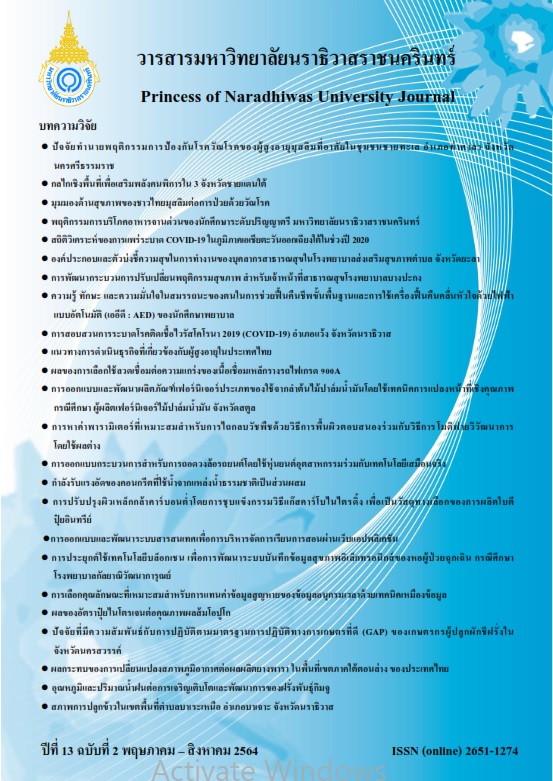Health Perspectives of Thai Muslim on Tuberculosis
Keywords:
Health perspective, Thai muslim, TuberculosisAbstract
The objective of this phenomenal qualitative study was to explain the views of Thai Muslims on tuberculosis. The informants were 10 patients diagnosed with tuberculosis. Qualitative data were collected by interviewing and non-participatory observation. The data were analyzed using the Van Manen's analysis. Results showed that the patients had the viewpoints towards tuberculosis into 3 types which were: 1) a disease caused by the will of God; 2) a lung disease; and 3) a disease that must be concealed and not be disclosed. As for the effects of tuberculosis with on Tuberculosis’ drug, it could be divided into 4 characteristics which were: 1) exhaustion or fatigue; 2) numbness liked a needle pierced; 3) lack of income or reduced income; and 4) depletion of religious practice.
The results indicated that tuberculosis-infected patients suffered from physical, mental, economic, and social illness. When taking tuberculosis drugs, adverse reactions from the use of drugs led to increased suffering. Incorrect and improper management could result in the lack of continuity of medication and the spread of infection in families and communities. Therefore, in the care of these patients, the healthcare team should have understanding on the context of faith and beliefs of Thai Muslim clients. They should also have the ability to provide appropriate self-care and prevention of infectious spread under the context of faith, beliefs and cultures. This would help encourage the patients to take care of themselves, as well as to manage the adverse symptoms caused by tuberculosis medication and reduce the suffering from their illness.
References
Choowong, J. (2019). Strategies for reduction of stigma in people with new smear positive pulmonary tuberculosis patients in Trang province. Journal of Health Research and Innovation, 2(1), 256-266.
Chaiwannajit, S., Makang, M., & Jintara, N. (n.d.). The Ways of life of Thai Muslim people that affect health promotion through adequate physical activities. Bangkok: Thai Health Promotion Foundation Jobs in Thailand. (In Thai).
Chantana, N., Maneesriwongul, W., & Putawatana, P. (2019). Factors Related to Adherence to Multi-Drug Resistant Tuberculosis Treatment. Rama Nurs J, 25(3), 296-309.
Drug allergy center, Siriraj Hospital. (n.d.). Adverse Drug Events. Retrieved January 9, 2020 from https://www.si.mahidol.ac.th/Th/division/ shdp/admin/.
Department of Disease Control. (2018). National Tuberculosis control Programme Guidelines, Thailand 2018. Bangkok: Aksorn Grphic and Design Publishing Limited Partnership. knowledges_files/13_27_1.pdf. (In Thai).
Department of Disease Control. (2019). Thailand's TB situation is still severe Found a new patient - returned to Repeat each year over 7,000 cases. Retrieved January 7, 2020 from https://www.hfocus.org.
Japakeeya, I. (2012). Patient's Guidline And Management according to Islamic principles. Nonthaburi: First offset Company Limited (1993) LTD. (In Thai).
Laurence Y.V., Griffiths U.K., & Vassall A. (2015). Costs to Health Services and the Patient of Treating Tuberculosis: A Systematic Literature Review. PharmacoEconomics, 33(9), 939-955
Mudo, N. (2012). In Japakeeya M. Patient guide and management according to Islamic principles. Nonthaburi: First offset Company Limited (1993) LTD. (In Thai).
Muslim Thai. (2014). Islam in Thailand. Retrieved January 9, 2020 from https://sites.google.com/ site/muslimtrat/introduction-to-islam/islam-thailand.
Marton, F., & Booth, S. (1997). Learning and Awareness. Mahwah, New Jersey, USA: Lawrence Erlbaum Ass.
Namwat, S. Khom, L., Praditsithikon, N., Lasirithaworn, Y., Maakian, S., Pinthadis, et,al. (2017). Return on Investment of Ending TB Strategies in Thailand: A Cost-Benefit Analysis. Full Research. Office of Global Fund Project Administratin, Department of Disease Control.
Prayatsub, P. (2018). Islam the Religion of Living. Retrieved January 9, 2020 from https://sk thai. org/th /articles/ Islam the Religion of Living.
Provincial Community Development Office of Yala. (2019). Quality of life Report: yala. Retrieved January 9, 2020 from https://yala.cdd.go.th/wp-content/uploads/sites.
Teerawit, P. (n.d.). Tuberculosis. Retrieved January 7, 2020 from https://med.mahidol.ac.th/med/ sites/default/files/public/pdf/medicinebook1/TB.pdf.
Tongsaman, A. Janpanicwisutpan, P. & Sumdandrit, B. (2016). Symptom Experiences, Symptom Management strategies and outcomes related to adverse drug reactions of anti-TB Drugs. Vajira Nursing Journal, 18(1), 51-63.
Van Manen M. (1999). Researching lived experience: human science for an action sensitive pedagogy. New York: State University New York Press.
Yala Provincial Public Health office. (2020). TB report Yala province. [Mimeographed].




